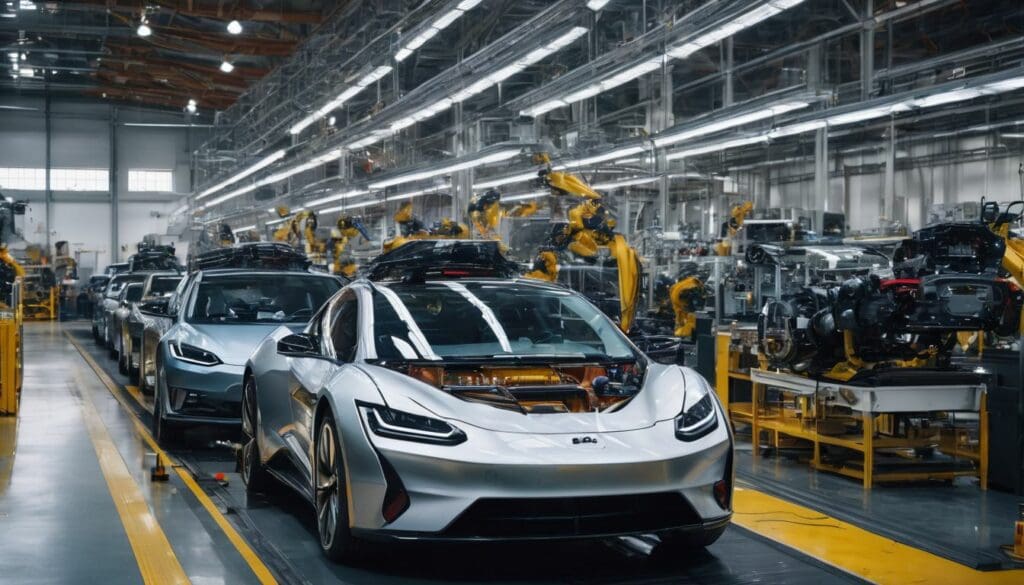As passionate car enthusiasts with an earnest concern for Mother Earth, we’re keenly aware of the urgent call to shift gears in our cherished automotive industry. Observing the impact of traditional vehicle production on our environment can’t help but strike a chord—it’s responsible for nearly 9% of global CO2 emissions, after all.
Our exploration into groundbreaking innovations has revealed a host of promising approaches that offer hope for a more sustainable future on four wheels. Join us as we unveil eco-wise solutions set to steer our beloved motors down a greener path — let’s journey together through these exciting developments!
Key Takeaways
- Automotive manufacturing contributes to carbon emissions, not only during car use but from production too; using renewable energy in factories and eco-friendly materials can lessen this impact.
- Governments enforce environmental regulations in the sector, pushing manufacturers towards sustainability; incentives are offered for green practices.
- Consumers now prefer cars that reflect their values of sustainability, driving automakers to focus on environmentally friendly manufacturing methods.
- Technologies like 3D printing reduce waste by using only necessary materials, and incorporating sustainable materials further diminishes the industry’s environmental footprint.
- Efficient transport strategies including use of trains or ships for long distances and maximising load capacity cut down carbon emissions during shipping of automotive parts.
Current State and Challenges of Automotive Manufacturing
The automotive manufacturing sector faces significant challenges in reducing its environmental impact, meeting changing consumer expectations and government regulations, and adapting to global megatrends.
These challenges call for innovative strategies to achieve sustainability in the industry.
Environmental impact
We recognise the toll that automotive manufacturing takes on our planet. Every car produced contributes to carbon emissions, not just when it’s driven but also during its creation.
From the vast amount of energy needed to extract raw materials to the pollution created by assembly lines, each step leaves an environmental footprint.
Using sustainable production methods can significantly reduce this impact. We’re talking about integrating renewable energy sources into factories and opting for ecofriendly materials that are better for the earth.
Shifting gears towards green manufacturing is no longer just a choice; it’s a responsibility we hold towards future generations.
Our next challenge is navigating government interventions which aim to steer us in this greener direction.
Government interventions
Governments worldwide implement regulations to curb the environmental impact of automotive manufacturing. These interventions aim to reduce vehicle emissions and promote sustainable practices in car assembly processes.
Manufacturers must adhere to stringent environmental standards, such as carbon footprint reduction and resource efficiency, enforced by government bodies.
Implementing renewable energy use and clean technology in production facilities is crucial for meeting these regulatory requirements. Additionally, governments provide incentives for ecoconscious manufacturing in the auto industry, encouraging manufacturers to adopt sustainable materials and embrace green practices throughout their operations.
Changing consumer expectations
Consumer expectations in the automotive sector are shifting towards environmentally friendly practices and products. Customers now seek vehicles that align with their values of sustainability and eco-consciousness.
They expect manufacturers to adopt green manufacturing processes, utilise sustainable materials, and reduce carbon emissions throughout the production and supply chain. As environmentally conscious individuals supporting conservation, we are becoming more inclined towards cars that use renewable energy in their manufacturing processes.
Our demand for eco-friendly manufacturing is influencing automakers to innovate and evolve with the changing consumer landscape.
In response to our environmental responsibility, manufacturers in the automotive industry are striving to meet our expectations by incorporating sustainable materials into car production and embracing eco-conscious practices.
Megatrends
We observe a shift in the automotive manufacturing industry towards sustainable practices, driven by various megatrends. These trends include the increasing demand for electric vehicles, advancements in autonomous driving technology, and the integration of digital solutions across the supply chain.
Manufacturers are also responding to growing concerns about climate change and environmental sustainability by embracing renewable energy sources and implementing eco-friendly materials in car production.
Additionally, there is a notable emphasis on reducing carbon emissions throughout the automotive sector as a response to stringent environmental regulations.
Strategies for Sustainable Manufacturing
We will explore how automotive manufacturers can balance profitability and eco-friendly practices, incorporate 3D printing technology, utilise sustainable materials, and address transport and shipping challenges.
Read more to learn about the strategies for creating a sustainable automotive industry.
Balancing the bottom line with the green line
To achieve sustainable manufacturing in the automotive sector, we integrate environmental concerns with financial viability. Adopting eco-friendly practices may involve initial investment, but it pays off in the long run by reducing operational costs and strengthening brand reputation.
Embracing renewable energy sources and optimising production processes contribute to a reduced carbon footprint without compromising on profitability. By prioritising green initiatives while considering economic implications, manufacturers can efficiently balance the bottom line with the green line, ensuring a positive impact on both business success and environmental conservation.
Incorporating sustainable practices into manufacturing not only benefits the environment but also enhances resource efficiency and overall competitiveness. Through innovative solutions such as recycling materials and implementing energy-efficient technologies, manufacturers can demonstrate responsible stewardship of natural resources while driving productivity gains.
Utilising 3D printing technology
3D printing technology enables the automotive industry to produce complex parts with minimal waste, reducing environmental impact. By using sustainable materials like biodegradable plastics or recycled filaments in 3D printing, manufacturers can further enhance eco-friendly car manufacturing processes.
This method also promotes energy efficiency by utilising only the necessary amount of material needed for production.
Incorporating 3D printing into automotive manufacturing not only reduces waste but also allows for more customised and lightweight designs, which ultimately contribute to lower fuel consumption and emissions during vehicle usage.
Incorporating sustainable materials
We can make automotive manufacturing more sustainable by incorporating eco-friendly materials. This includes:
- Utilising recycled plastics and composites in car parts to reduce the use of virgin materials and decrease waste.
- Exploring the use of bio-based materials such as natural fibres, soy foam, and bio-resins to replace traditional petroleum-based components. This reduces carbon emissions and reliance on non-renewable resources.
- Introducing sustainable textiles made from organic cotton, hemp, or recycled fabrics for interior trims, upholstery, and carpets in vehicles.
- Adopting lightweight materials like aluminium, magnesium, and high-strength steel to reduce vehicle weight, improving fuel efficiency and lowering emissions.
- Incorporating sustainable packaging materials for shipping automotive components to minimise environmental impact throughout the supply chain.
Addressing transport and shipping
To further reduce the environmental impact of automotive manufacturing, we optimise transport and shipping processes. This involves utilising more energy-efficient modes of transportation, such as trains or ships instead of lorries for long-distance shipments.
Additionally, consolidating shipments and maximising load capacity helps to reduce fuel consumption and lower carbon emissions during transportation.
Furthermore, incorporating sustainable packaging materials for shipping also plays a vital role in minimising waste and environmental impact. By using recyclable or biodegradable materials, we can significantly decrease the ecological footprint associated with product packaging and shipping processes.
Benefits of Sustainable Manufacturing
– Sustainable manufacturing not only helps in reducing the environmental impact but also leads to improved business practices and greater consumer appeal.
– The use of eco-friendly materials and energy sources can result in lower carbon emissions, making automotive manufacturing more environmentally friendly.
Improved business practices
Implementing sustainable manufacturing practices in the automotive sector results in improved business practices. By focusing on eco-friendly production methods and renewable energy use, companies can reduce operational costs while boosting their brand image.
Additionally, adopting sustainable materials and streamlining processes minimises waste and makes manufacturing operations more efficient.
Embracing green manufacturing not only aligns with environmental values but also enhances overall competitiveness. Companies that demonstrate a commitment to sustainability attract environmentally conscious consumers and gain a competitive edge in the market.
Greater consumer appeal
Consumers are increasingly seeking environmentally friendly products, including cars. Sustainable manufacturing in the automotive sector is gaining greater consumer appeal as people become more conscious of their environmental impact.
Using renewable energy, sustainable materials, and eco-friendly practices in car production aligns with the values of environmentally conscious individuals who support conservation efforts.
Manufacturers that prioritise sustainability in their production processes are likely to attract a growing segment of consumers who are committed to reducing carbon emissions and promoting eco-friendly manufacturing practices within the automotive industry.
Moving towards a sustainable automotive industry not only benefits the environment but also appeals to consumers who prioritise ecoconscious manufacturing when making purchasing decisions.
Lower environmental impact
Implementing sustainable manufacturing practices in the automotive sector substantially reduces carbon emissions and minimises environmental damage. Incorporating eco-friendly materials and renewable energy sources throughout the production process significantly decreases the industry’s ecological footprint.
Adapting to green manufacturing not only benefits the environment but also aligns with consumer demand for environmentally conscious products, thereby fostering a more sustainable automotive industry.
By utilising innovative 3D printing technology and embracing digital solutions, manufacturers are actively reducing waste and energy consumption while producing vehicles. The shift towards ecoconscious manufacturing in the auto industry is essential to promote a greener future, ensuring that we preserve our planet for generations to come.
Moving Towards a Sustainable Automotive Industry
We must embrace digital solutions, evolve with changing consumer demands, collaborate between manufacturers and suppliers, and implement sustainable practices throughout the supply chain to create a more environmentally friendly automotive industry.
To learn more about how we can achieve this, read our full blog on sustainable manufacturing in the automotive sector.
Embracing digital solutions
To move towards sustainable manufacturing in the automotive sector, we prioritise embracing digital solutions. This involves integrating advanced technologies to optimise production processes and minimise environmental impact.
By implementing innovative digital tools such as IoT (Internet of Things), AI (Artificial Intelligence), and big data analytics, we aim to streamline operations, enhance energy efficiency, and reduce waste in our manufacturing facilities.
Additionally, digitisation enables us to monitor real-time data on resource consumption and emissions, allowing for informed decision-making that aligns with eco-friendly practices.
Moreover, embracing digital solutions entails leveraging automation and robotics to improve precision and consistency while lowering energy usage during assembly and manufacturing stages.
Evolving with changing consumer demands
Manufacturers must continually adapt to changing consumer demands for more environmentally friendly vehicles. This means creating cars with higher fuel efficiency, lowering emissions, and integrating sustainable materials into the production process.
As ecoconscious individuals demand greener options, manufacturers need to prioritise electric and hybrid vehicles while also focusing on enhancing the overall sustainability of traditional vehicle models.
Moreover, consumers are increasingly looking for transparency in manufacturing processes and supply chains. They want assurance that the products they purchase align with their environmental values.
This shift demands greater collaboration between manufacturers and suppliers to ensure sustainable practices at every stage of production.
Collaboration between manufacturers and suppliers
Collaborating closely with suppliers ensures that sustainable practices are upheld throughout the supply chain. This partnership can lead to the use of eco-friendly materials and renewable energy sources in manufacturing processes, reducing carbon emissions. Suppliers and manufacturers working together can innovate and implement sustainable transport and shipping solutions, decreasing the environmental impact of automotive production. By fostering collaboration, manufacturers and suppliers can share best practices, fostering a culture of environmental responsibility within the automotive industry. Additionally, joint efforts can drive research and development towards more sustainable manufacturing processes, contributing to a greener automotive sector overall.
Implementing sustainable practices throughout the supply chain
We ensure that sustainable practices are integrated into all aspects of the supply chain. This includes:
- Sourcing raw materials from ethical and environmentally responsible suppliers to reduce the environmental impact at the beginning of the manufacturing process.
- Collaborating with logistics partners who prioritise energy-efficient transportation methods, such as electric vehicles or biodiesel-powered trucks, to minimise emissions during product distribution.
- Regularly monitoring and auditing suppliers to ensure compliance with sustainability standards and encouraging continuous improvement in their environmental performance.
- Investing in renewable energy sources throughout the production process to reduce reliance on non-renewable energy and decrease carbon emissions associated with traditional power generation.
- Implementing waste reduction measures within our facilities, including recycling programmes and responsible disposal practices to minimise the overall ecological footprint of our operations.
- Engaging in partnerships with local communities and non – profit organisations to support reforestation efforts and other environmental conservation initiatives, contributing to a more sustainable ecosystem.
- Encouraging collaboration with downstream businesses in recycling used materials or adopting circular economy principles, fostering a closed-loop system that reduces waste and promotes resource efficiency throughout the product lifecycle.
Conclusion
In conclusion, sustainable manufacturing in the automotive sector is crucial for reducing environmental impact. Embracing digital solutions and evolving with changing consumer demands are key steps towards a greener future.
Collaboration between manufacturers and suppliers is essential for implementing sustainable practices throughout the supply chain. Implementing these strategies will lead to eco-conscious manufacturing, supporting conservation and environmental sustainability in the auto industry.
FAQs
1. What is sustainable manufacturing in the automotive sector?
Sustainable manufacturing in the automotive sector involves using eco-friendly practices to make cars, aiming to reduce carbon emissions and increase renewable energy use.
2. How are car manufacturers reducing their impact on the environment?
Car manufacturers are adopting environmentally friendly production methods, like using sustainable materials in car production and green manufacturing processes that lower pollution.
3. Why is environmental sustainability important in the automotive industry?
Environmental sustainability helps protect our planet by ensuring that car making minimises waste and conserves resources for future generations within the auto industry.
4. Can eco-conscious manufacturing really make a difference in reducing global warming?
Absolutely! Eco-conscious manufacturing contributes significantly to cutting down greenhouse gases from the automotive sector, helping fight against climate change.





